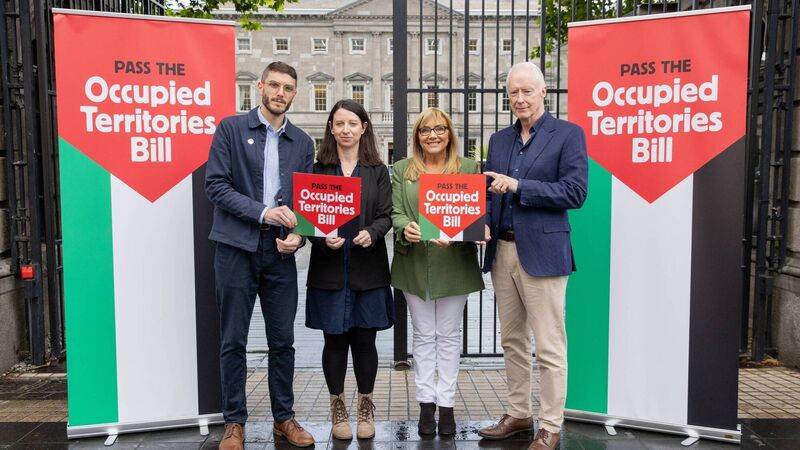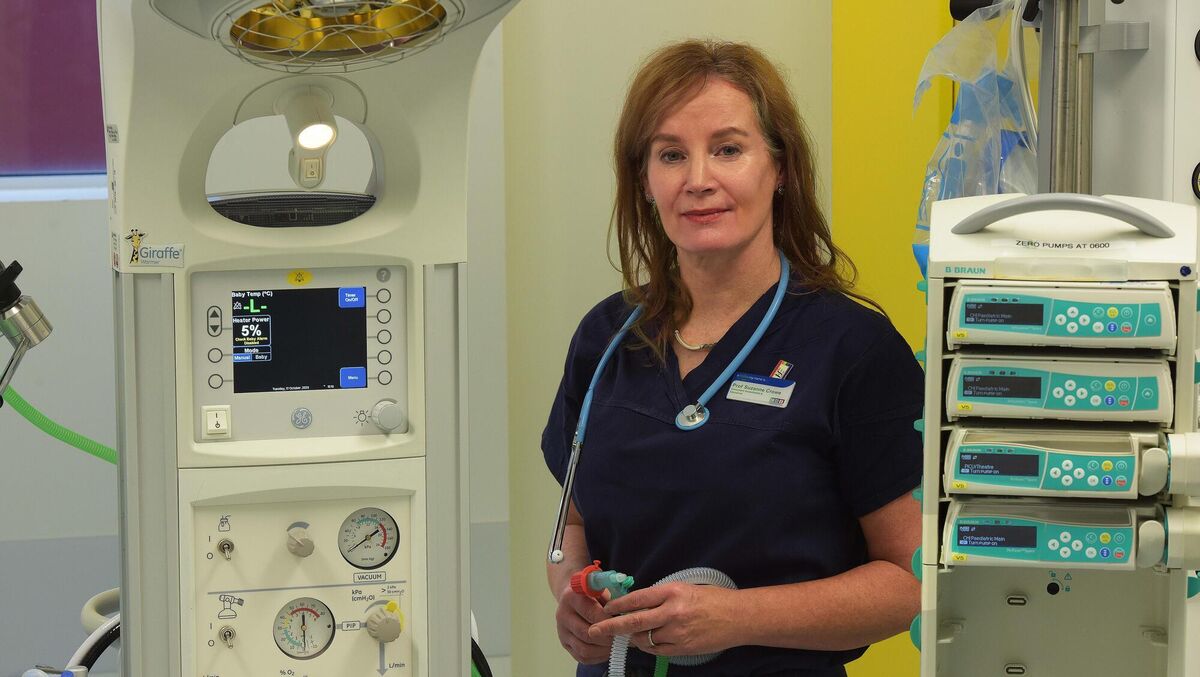Letters to the Editor: Man-made famine unfolding in Gaza

Conor O’Neill, Christian Aid Ireland; Karol Balfe, ActionAid Ireland; Senator Frances Black, and Éamonn Meehan, Sadaka; at the launch of the campaign to pass the Occupied Territories Bill last December. Picture: Gareth Chaney
It has now been two long, harrowing months since Israel reinstated a total siege on Gaza, blocking the entry of life-saving humanitarian aid and commercial goods into a region already devastated by war.
This marks the longest period Israel has blocked all aid and goods from entering Gaza in history.
With community kitchens — one of the last remaining lifelines in Gaza — now threatened with closure, the world is witnessing a man-made famine unfolding in real time.
Desperation has reached unspeakable levels. Mothers are boiling grass to feed their families. Children are suffering unbearable hunger, trauma, violence, and abandonment.
Gaza’s hospitals, already crippled, are close to collapse, unable to function without essential medicines, vaccines, and equipment.
Women, girls, and other vulnerable groups face escalating risks of gender-based violence.
Stocks in aid warehouses are nearly gone. Palestinian organisations continue to seek to supply desperate communities through local markets, but they are facing eye-watering prices.
Yet world leaders are distracted it seems, while the ethnic cleansing and likely genocide of Palestinians rages on.
As the UN Secretary-General put it, Gaza is a killing field, and its civilians are trapped in an endless death loop.
The weaponisation of aid, including withholding food, water, healthcare, and shelter, has led to a surge in preventable deaths and threatens the dignity and survival of Palestinians in Gaza.
This is a preventable atrocity. And it does nothing to address the horror of the remaining hostages and their families.
Meanwhile, Israeli forces have intensified military operations in the occupied West Bank, severely disrupting humanitarian aid delivery there.
This includes demolishing Palestinian homes, forcibly displacing approximately 40,000 people, and destroying critical infrastructure.
World leaders must demand an immediate end to the blockade, and tough action must be taken against Israel and its shredding of international law.
Every hour of delay in restoring aid costs more lives. This brutal, illegal, and devastating occupation of Palestinian territory and its people must end.
The Irish Government must also play its part; stop wavering, and honour its pre-election pledge to introduce the Occupied Territories Bill. This would show true leadership on one of the most devastating issues of our time.
This is a moment of moral reckoning. A moment when the world must step up. Otherwise, history will not be kind.
We the undersigned general practitioners of Cork, on April 29, 2025, wish to condemn the ongoing genocide being perpetrated on the Palestinian people by Israel, and call for the immediate expulsion of Israel from international medical organisations such as the World Health Organization and the World Medical Association.
We demand that the Irish Medical Council, the Irish College of GPs, and the Irish colleges representing other specialties such as surgery, medicine, anaesthesiology, etc, echo this condemnation of Israel, and similarly call for its expulsion from the above organisations.
Several recent public commentaries in the media and in the have made a compelling case for the increased military spending as the price of peace in Europe.
This argument goes that Nato’s presence and increased military expenditure may represent the price for peace and longer-term prosperity.
To some extent, history supports this.
The nuclear arms race between the US and USSR provides a classic example of such brinkmanship where the risk of collateral damage was so great that it acted as a deterrent to nuclear war.
However, the reality is more complex than simple measures of military expenditure.
During the 1990s, when average Nato military expenditure exceeded the 2% target, Europe experienced conflict in the Balkans.
Neither did such spending deter Nato members from military interventions in third countries.
While it is true that military spending boosts economic growth through what is known as military Keynesianism, this spending is often capital-intensive and wasteful compared to other forms of investment.
Analysing US military spending in the Vietnam War in the 1960s, the economist Leslie Fishman noted that because governments typically seek to keep their own military casualties low, military expenditure is necessarily much more capital-intensive than other sectors of the economy.
This means that the current European efforts to repurpose industrial facilities for military purposes may lead to poor long-term returns.
Moreover, the casualties from the US war efforts since the 1950 were of such magnitude that it made any cost-benefit analysis meaningless.
On the other hand, Fishman noted that post-war initiatives such as the Marshall Plan had a high return for the US, keeping the Soviet Union at bay for relatively small outlays.
Finally, military spending is often itself destabilising.
US efforts to contain communist China during the 1950s and 1960s and its build-up of military capabilities in the Middle East have all contributed to current instability.
The original article from Dr Suzanne Crowe — ‘Punishing those who speak out fails us all’ ( , April 23) and the responding letter from Aisling McNiffe — ‘Speaking up for Ireland’s voiceless’ (May 1) — were both written as mothers.
As yet another mother, I agree with both of them.
I also am the parent of an adult with a disability, not one with the acute medical needs that Aisling’s son has, but without the 24/7 supervisory care that I provide, my child would soon sink.
The real underlying unaddressed issue here is one of ‘power over’, equity, and the undeniable fact that our current systems are systems of dominance, patriarchy, hierarchy, and therefore, control.

They are systems of ‘old’ and not fit for purpose in this modern world that we live in — they need radical transformation.
It’s time to unlearn and rebuild new systems that genuinely serve the people as they are meant to.
It’s been said that women and girls are conditioned to believe success is “a seat at the table”.
It is my belief that we need a new table and one that women help build because “equity is not about who’s at the table, it’s about who built it — what is served, and who benefits most”.
The GAA president Jarlath Burns has, this week, confirmed that the All-Ireland finals will continue to be played in July in 2026, with the hurling final to be played on July 19, the same day as the soccer World Cup final in America.
In these circumstances, An Taoiseach should, at the first available opportunity, make a request to US president Donald Trump to have the date of the World Cup final moved.
The ace Micheál Martin holds in making this ‘deal’ with Mr Trump, is his ability to deploy every ounce of Irish blarney and native cunning in convincing Keir Starmer to have the 2028 British Open played at Trump’s Turnberry golf course, which, it seems the US president is becoming obsessed about.


